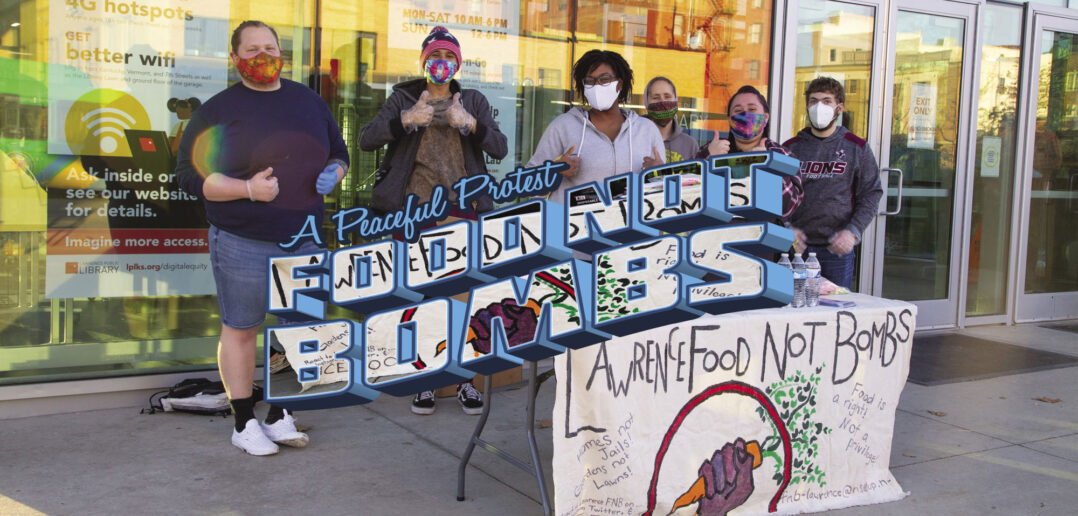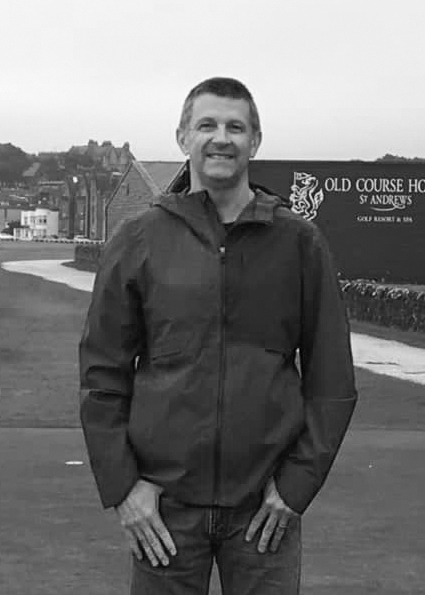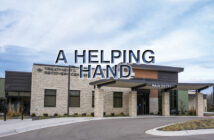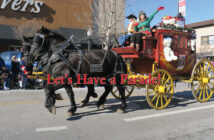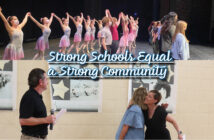| story by | |
| photos by | Steven Hertzog |
| OPEN A PDF OF THE ARTICLE |
Putting a spotlight on war, poverty and the destruction of the environment, the Food Not Bombs movement recovers good food headed for the trash and makes vegetarian and vegan meals for those in need.
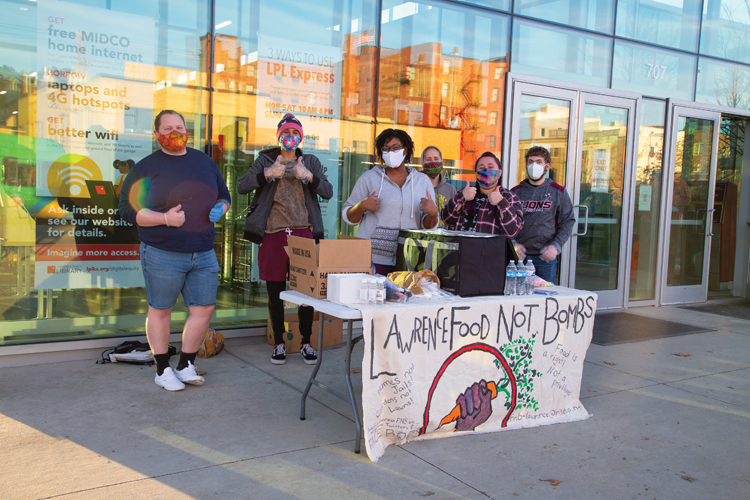
Claire Nderagakura (in the middle) with Food Not Bombs volunteers at the Lawrence Public Library every Monday from 5:30-6:30pm
Lawrence is a town that shows great pride in the number of charitable civic organizations in its midst. There’s one longtime stalwart of the city’s food system that’s gone about things in a different way.
In fact, anyone involved with Food Not Bombs insists, first and foremost, that the organization is not a charity. Rather, it is a collection of volunteers that prepares and serves free vegetarian or vegan meals to the less fortunate as a means of protest against the long-held systemic capitalization of the federal government, particularly in the area of the military industrial complex. It seeks to inspire the public to participate in changing society and focus resources on solving problems like hunger, homelessness and poverty while seeking an end to war and the destruction of the environment.
“Our motto has always been ‘Solidarity, Not Charity,’ ” says local farmer and longtime Food Not Bombs volunteer Pantaleon Florez III. “Food Not Bombs has always tried to stay away from charity models and all the bureaucracy that comes with that. We’re giving for the sake of giving. There are 40 million in this country who go to bed hungry every night, 12 million of them children. That’s who we’re trying to help.”
Food Not Bombs traces its origins back to May 24, 1980, in New England when co-founder and Boston resident Brian Feigenbaum was arrested for protesting to stop the Seabrook Nuclear Power Station in New Hampshire. A group of Feigenbaum’s friends vowed to raise funds for his legal expenses and started holding bake sales outside the student union in Harvard Square.
That led to the idea of gathering discarded produce and other food items from grocery stores, restaurants, farms and the like, and using it to prepare meals for those in need. The people who started Food Not Bombs shared their first full meal on March 26, 1981, outside the Federal Reserve Bank during the stockholders meeting of the Bank of Boston to protest the exploitation of capitalism and investment in the nuclear industry. The decision was made early on to make the meals completely vegetarian or vegan because 1) of the safety factor of handling recovered meat and 2) as a protest of animal cruelty and factory farming.
Today, Food Not Bombs’ website lists more than 500 chapters, but it’s believed there actually are more than 1,000 chapters in more than 60 countries around the world. There are nearly 500 chapters in cities throughout the United States.
The Lawrence chapter of Food Not Bombs started in the late 1980s and, Florez explains, has undergone a handful of incarnations during the years.
“There’ve been a few waves,” he says. “I think we’re probably on about our fourth wave right now. A lot of the support we get has come from students at [the University of Kansas]. So we’re dependent on how that and the rest of our volunteer network sustains itself since we’re not sponsored.
“It’s poor people helping poor people,” he continues. “We don’t always have the means, but we seem to get by.”
Lawrence Food Not Bombs volunteers serve homemade vegetarian or vegan meals to approximately 50 to 60 people from 5:30 to 6:30 each and every Monday evening in front of the Lawrence Public Library. That number of people served jumps higher during summer months. Volunteers source food from local farms and other volunteers, and coordinate with the Sunrise Project kitchen. On evenings when there’s food left over, volunteers might take it to a winter shelter or even travel to areas where there are homeless conclaves and distribute it there.
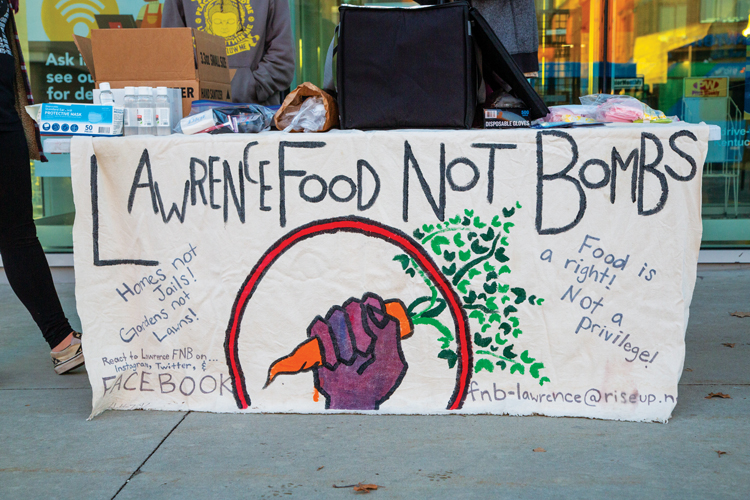
Food Not Bombs volunteers at the Lawrence Public Library every Monday from 5:30-6:30pm
Another unique aspect of Food Not Bombs is that it operates without a leadership structure. There is no board to answer to, no chapter officers to run ideas or initiatives by before proceeding. Chapters are fully autonomous and operate strictly through the work of grassroots volunteers.
It’s that structure that’s allowed a volunteer such as Clare Nderagakura to go from delivering one meal to cooking for large groups to procuring office space and creating her own “community closet” in a short period of time.
“I delivered one meal, and I knew I needed to keep things going,” she says. “So I started to cook. I posted on social media and found a group of people willing to come in and help.”
Nderagakura says the hard part for her was learning how to cook without using meat. For her community closet, she gathers other items such as toiletries and clothes, and brings many of those items with her on Monday evenings to the library.
“From Oct. 21 (2020) to Nov. 9 was the time from when I started to cook to the time I got an office space,” she says, noting that the leaderless model of the Food Not Bombs organization allowed her the freedom to move that quickly.
“I hear from people who get meals each week,” Nderagakura says. “They’re so excited about it. They really enjoy them. We’re seeing more and more people all the time.”
Florez says the Lawrence Food Not Bombs chapter has weathered the COVID-19 pandemic just fine. Through a culinary artist grant connected with Rebuilding East Ninth Street, he was able to procure some personal protective equipment (PPE) and to-go containers for meals to keep people safe. This helped Food Not Bombs stock enough PPE and to-go containers back in May 2020 to get them through at least April.
“I think it’s great that we have a strong core group [of volunteers]that’s rooted here along with the mix of young college kids,” he says. “[For the future], I just plan to organize more people, organize more cooks. For me, expansion is mainly about organizing more people and getting more people involved.”
Florez, a former schoolteacher, says he’s putting together a communal cooking handbook for future volunteers.
Nderagakura says she sees a community that’s ready for more Food Not Bombs.
“People in Lawrence are ready and willing,” she says. “As long as they know there’s a need out there and what it is, Lawrence is ready to go.” p
![]()

